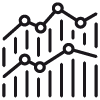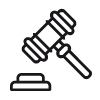
In professional services firmswhich, at internship sustainability, are growing at double-digit rates in both sales and headcount.

In commercial and investment banksThe EU's sustainable finance plan is mobilizing nearly 180 billion euros over this decade to transform the sustainable economic model .

In law firmsThe sustainability areas are developing to respond to the growing regulatory burden from the EU at subject .

In public and private institutions international, national, regional or local level, which are promoting regulation on sustainability and deploying public policies in this field

In non-governmental and civil society organizations, to promote public-private partnerships in sustainability

In the regulatorsespecially in securities markets, which analyze non-financial or sustainability information as an element core topic to introduce transparency in the markets.

In indexes and ratingsto provide reliable information to market players on the sustainability performance of companies.

In companies of all sectors and in virtually all functional areas
-
In corporate strategy, to help companies in their transformation process towards a sustainable economic model .
-
In the financial areas, both to help business to obtain sustainable financing, and to systematize the reporting of non-financial information to transmit confidence in the markets.
-
In the areas of operations, to implement efficient production processes that reduce energy costs and greenhouse gas (GHG) emissions in all their scopes and to deploy circular Economics mechanisms.
-
In the areas of technology, to deploy information systems that enable the availability of data necessary to manage sustainability and, especially, non-financial reporting.
-
In HR, to deploy equality, reconciliation and diversity policies, reduce salary gaps and incorporate ESG criteria in compensation.
-
In communication, to generate systematized processes of listening and dialogue with stakeholders and to avoid Greenwashing.
-
In the legal areas, to promote corporate governance mechanisms that guarantee an orderly, transparent and integral decision-making process in order to generate an environment of trust.
-
In the internal audit areas , to implement internal control systems for non-financial information and non-financial risk maps.
-
In procurement, to deploy supply chain traceability policies, due diligence responsibilities and compliance with ethical and human rights criteria.
-
In logistics, to ensure efficient transportation and distribution to help measure and reduce GHG emissions.
-
In marketing and innovation, to design sustainable products throughout the distribution chain, including the point of sale.
-
And, in the areas of sustainability, which have to drive this new model of management throughout the company.
